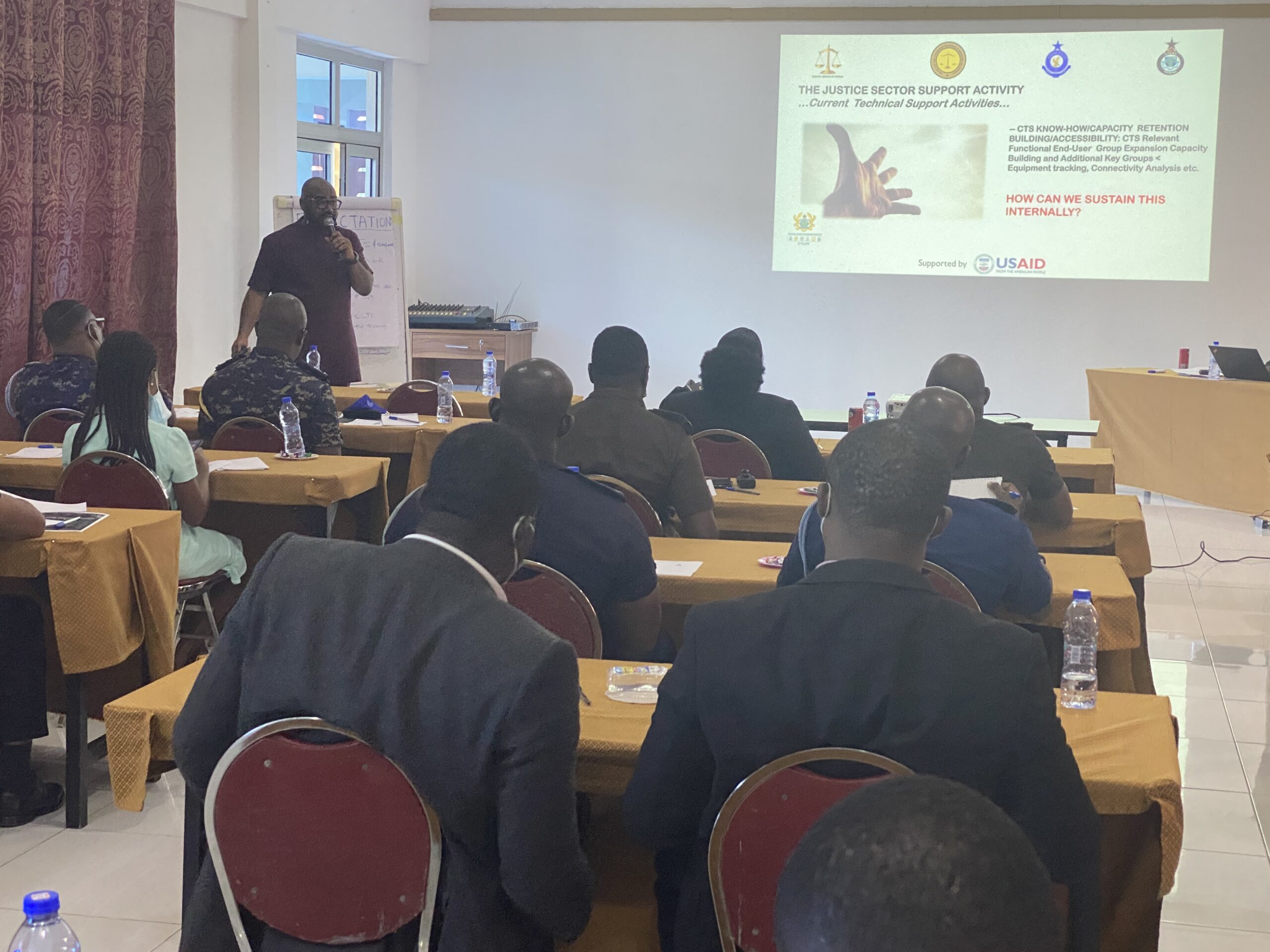Volta Region: CTS Management workshop held for JSIs
A Case Tracking System (CTS) Change Management Workshop has been organized in Ho for the CTS frontline staff of Justice Sector Institutions (JSIs) within the Volta Region.
The institutions include the Judicial Service, the Ghana Prison Service, the Office of the Attorney General and Ministry of Justice, Ghana Police Service and the Legal Aid Commission.
The main objective of the workshop, for these foundational CTS criminal case docket institutional creators and contributors, was to provide a forum for the respective key functional processing supervisory staff, to discuss applicable change management strategies, and to recommend the requisite tools, and institutional strengthening requirements needed to re-enforce the adoption and utilization of the Case Tracking System on behalf of the Government of Ghana.
The one-day workshop which was under the theme ‘CTS adoption and utilization re-enforcement strategies and tools for leaders of key stakeholder agencies’ was a necessary co-operative inter-agency agenda for the participant JSIs to sensitize the people, to gain a better understanding of the system components (people, process, technology) of the CTS, needing capacity building, and the aligned CTS benefits to which, the respective agencies, can adopt change management strategies — to whip up support for the use of the system by the staff of the agencies as well as their leadership.
The Case Tracking System is an integrated criminal case tracking technological tool/application iteratively tailored to digitize the manual tracking processes and lifecycle information of criminal justice agencies in Ghana commencing with the foundational agencies referenced. The project, which commenced in 2018, was to see to the timely and accurate delivery of justice through coordination and information sharing of the state agencies fighting crime. The CTS has the capabilities to query historical criminal data and its trends across communities, districts and all regions in Ghana, while in real-time harnessing information sharing and coordination capabilities – towards the timely, effective and efficient delivery of justice processes.
The Case Tracking System also has the ‘cycle of cases’ capability from the Ghana Police Service or the Economic and Organised Crime Office; to the Legal Aid Commission or the Attorney General’s Office; to the Judicial Service; and to the Prison Service. The system’s integration components enables the benefits of digitized records, and its processing in the format of an electronic case docket across its lifecycle. The operational components for accessibility covers online, off-line and smart device/android capabilities. The workshop facilitator took the participants through change management strategies and discussion sessions were held on the way forward of the CTS drawing on the experiences of the participants when they used the system. The issues highlighted during the discussion sessions were what worked and what did not work in the piloting of the system within the seven (7) inception regions (Greater Accra/Tema, Volta, Northern, Ashanti, Bono, Western and Upper East). The participants, among others, noted that one of the setbacks of the system’s use was poor network connectivity and its unreliable availability at their respective sites, accessibility to equipment, the lack of operational and ICT know-how, and
the people factor that emanates resistance to change for the adoption and utilization of new technology-enabled institutional systems.
In spite of these recognized real challenges highlighted by the participants, they equally celebrated the system thus far in its pilot offerings and the extent to which this external innovation had not only presented insight data that showcases the institutional gaps in the manual procedure, but also the lack of usage in vital areas of the lifecycle procedure. Attributes also showcase the capabilities of the eDocket in digitizing their manual work processes and inter-agency coordination towards the speedy delivery of justice, through a well-coordinated information flow between the allied criminal justice agencies.
There was a session for the participant to work out and document identified issues ( internal institutional transfers, know-how, equipment accessibility, connectivity reliability, etc.) and corresponding solutions and recommendations (CTS national budgeting, connectivity prioritization for CTS sites, more rooted institutional ICT involvement from the headquarters, sustained implementation, training, and capacity building, dedicated CTS resources, etc.) towards its submission to their respective institutional head in the framework of a CTS Change Management Policy in line with the theme of the agenda.
The workshop was organized by the local tech-enabled consulting firm, Inter-Regional Bridge Group (IBG TECH) in collaboration with the Legal Resources Centre (LRC), Commonwealth Human Rights Initiative (CHRI), and Crime Check Foundation (CCF) and was sponsored by the United States Agency for International Development Justice Sector Support Activity (USAID JSSA).
USAID Justice Sector Support Activity
The USAID Justice Sector Support Activity (JSSA) aims at increasing citizen knowledge and access to Justice Sector services, strengthening advocacy interventions for accountability of key Justice Sector Institutions to improve justice delivery, and increasing citizens’ oversight and monitoring of criminal cases to enhance justice delivery.




